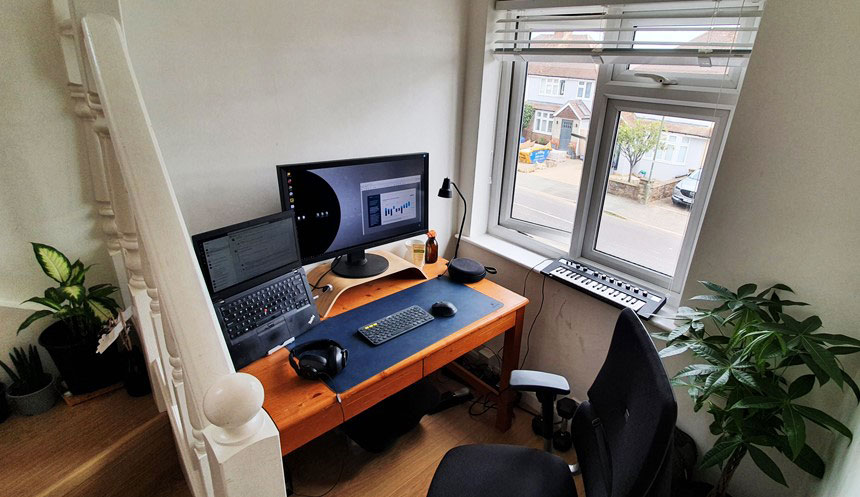- Yonseians Around the World Teleworking in the Era of COVID-19 September 23, 2020
-
Stories of Yonsei alumni working from home in different parts of the world
Since the global outbreak of the novel coronavirus (COVID-19), members of the Yonsei community face drastic changes in their everyday lives. The most significant change for most Yonsei alumni is teleworking, which has now become the norm due to the pandemic and the rapid development of digital technology. As COVID-19 continues to sweep across the globe, the number of companies introducing teleworking is continuously increasing, expecting to impact businesses and economies significantly.
So how are our alumni working from home? Here are a few stories from Yonseians working in different parts of the world shared through non-face-to-face interviews.
--------------------------------------------------------------------------------------------------------------
Gyedo Jeon (entering class of ‘93, Computer Science)
Living in California, United States. Working at DreamWorks Animation
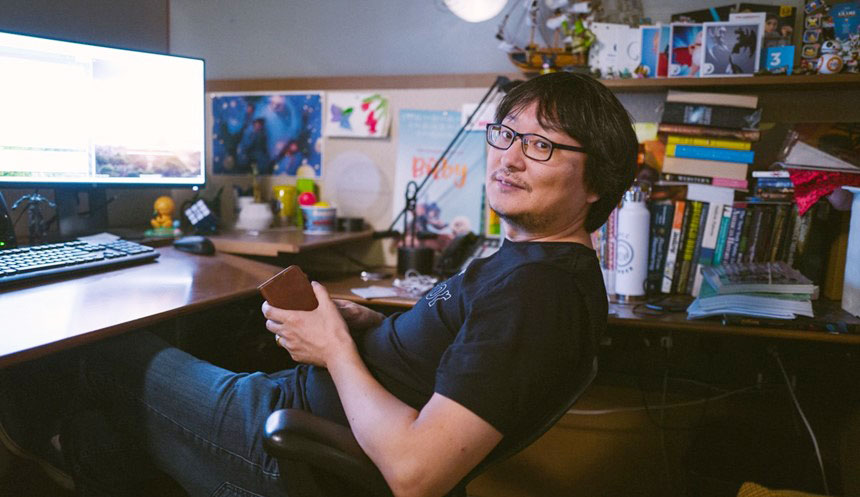 At Jeon's company office
At Jeon's company officeTell us about yourself. What do you do?
Hello, my name is Gyedo, and I am currently working as a technical director at DreamWorks Animation, located in Glendale, a small town near Los Angeles. My job description is similar to that of a software developer, not a manager.
How long have you been working from home due to COVID-19? How has it been?
On March 16, in the early days of COVID-19, I started working from home for two weeks, but the situation got worse, and now it has changed to indefinite teleworking. Since my company uses high-spec computers to create feature animations, I can’t work with a regular computer. So, I work with remote access to a high-performance computer at the company. Fortunately, there are graphics-only remote access programs that can be used in these circumstances, so I don’t have much trouble working from home. I used to communicate a lot with my colleagues through online messenger at work, which is similar nowadays. And we are conducting meetings using online video conferencing programs like many other companies.
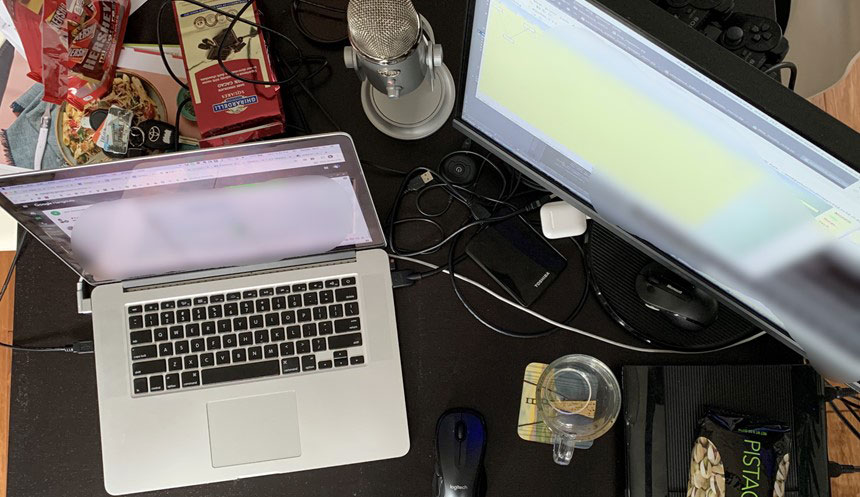 Jeon's first work-from-home space in his living room ("So many snacks...")
Jeon's first work-from-home space in his living room ("So many snacks...")Tell us about the changes in your life since COVID-19.
Before COVID-19, I started my day by leaving home at 7:45 am, dropped off my kid at school, arrived at the office at around 8:30 am, and had breakfast at the office. Now, I am working from home, and my child is taking classes online. Then summer vacation came and went, and the fall semester is also being held online. It has become more relaxing in the morning. I used to leave from work at 6 pm, arrive home at around 6:30 pm, and have dinner with the entire family. But nowadays, I spend way more time with my family as we eat all three meals together.
What are the pros and cons of teleworking?
For me, the biggest change would definitely be that commuting hours are gone. I don’t live far away from the company, which takes about an hour-long round trip every day. Although it doesn’t seem like much, I also don’t have to shower every day like when I go to work (haha), saving some time in the morning. I would say a simplified life may be an advantage. I think the downside would be that I am not able to meet my colleagues face-to-face, chat, and walk around the company grounds together.
Lastly, please send a message to Yonseians in Korea and around the world.
Although Korea seems to be in a better situation than the United States, I pray for everyone’s health during this unprecedented global pandemic. Today I will strive to work diligently, remembering the Yonseians fulfilling their duties with love and service to their neighbors, wherever they are.
Kyungmin Seo (entering class of '04, Political Science & International Studies)
Living in Mexico City, Mexico. Working at POSCO International
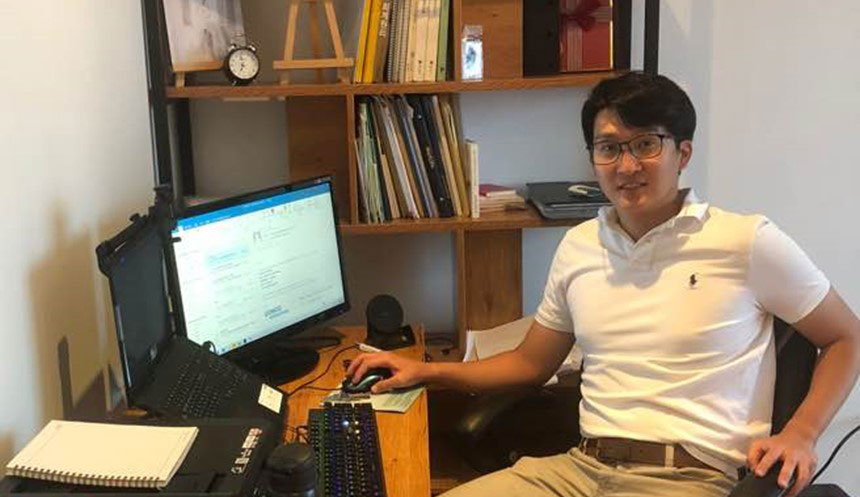 Seo's teleworking space
Seo's teleworking spaceTell us about yourself. What do you do?
My name is Kyungmin, and I am currently working as a sales team leader for steel products at POSCO International’s Mexico Trading Corporation. My main duties include supplying steel materials to global home appliances and electronics companies in Mexico and North America, SCM management, and procuring steel raw materials. My office is located in Mexico City, the capital of Mexico. However, the range of activities spans across the entire Mexico and North America region, as client companies are spread out in different areas.
How long have you been working from home due to COVID-19? How has it been?
As one of the countries with the worst outbreak of COVID-19, Mexico had canceled all nonessential business activities, with company operations currently limited to 30 percent of the normal. In the company where I work, all employees are working remotely except for those in the finance and accounting departments. The hardest part of working from home is communicating with team members or customers in North America, including Mexico. I am trying to overcome it by using video conferencing platforms because it has become impossible to hold face-to-face meetings and go on business trips. It is high time when people need to find an ideal communication method to replace face-to-face meetings in this ‘untact’ era by continuously searching for a more efficient video conferencing method.
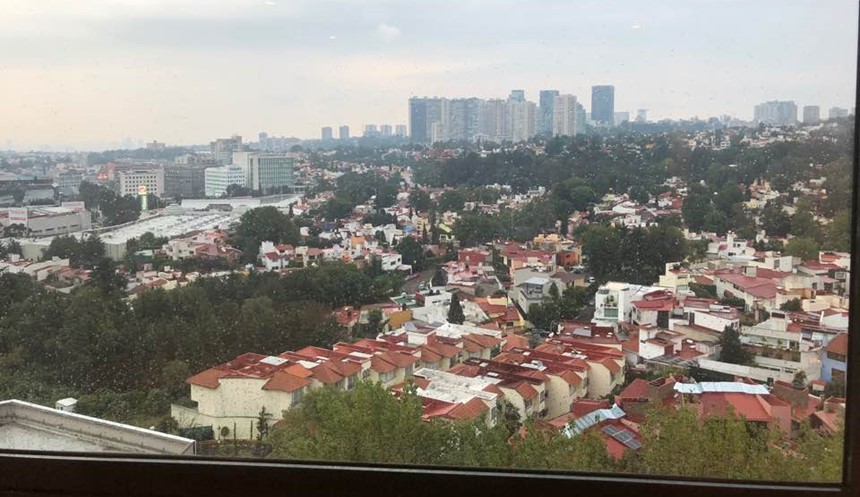 View of Mexico City from Seo's teleworking space at home
View of Mexico City from Seo's teleworking space at homeTell us about the changes in your life since COVID-19.
This pandemic has brought a big change to our homes. My family had no choice but to stay in Korea, and I have been living in Mexico apart from them for nine months. Not knowing when we will see each other again is psychologically the most difficult part. For the first time in recent decades, it is not easy to get a house and live alone without a family. I am spending very monotonous and lonely days since I am still not fully adapted to this lifestyle.
My daily routine starts by doing stretches, eating fruit, washing my face, and going to a workstation that I built in the library to work. In the mornings, I write up a to-do list after checking e-mails and other materials sent from the headquarters in Korea. Then, I hold a video conference with my team members. I finish work by holding meetings with business partners online or by phone at intervals to discuss business and report my daily work performance to relevant departments and corporate heads at the headquarters.
What are the pros and cons of teleworking?
Teleworking doesn’t seem to have many advantages apart from saving the commuting time, which helps to spend your time more efficiently. The downside would be less work efficiency because of a lack of control and management of employees’ work.
Lastly, please send a message to Yonseians in Korea and around the world.
We are currently experiencing the most terrifying epidemic since the Black Death that had swept across Europe in the 14th century. In this era, I believe that the foremost, second-most, and third-most important thing is health. In particular, I would like to convey many words of comfort and encouragement to Yonseians who left their homeland and are working actively abroad. The bright days will surely come again, and I hope we will not lose hope and expectations for the future. I cheer for my fellow Yonseian classmates and juniors from faraway Mexico.
Minje Sung (entering class of ’95, English Language & Literature)
Living in Addlestone, UK. Working at Publicis Groupe
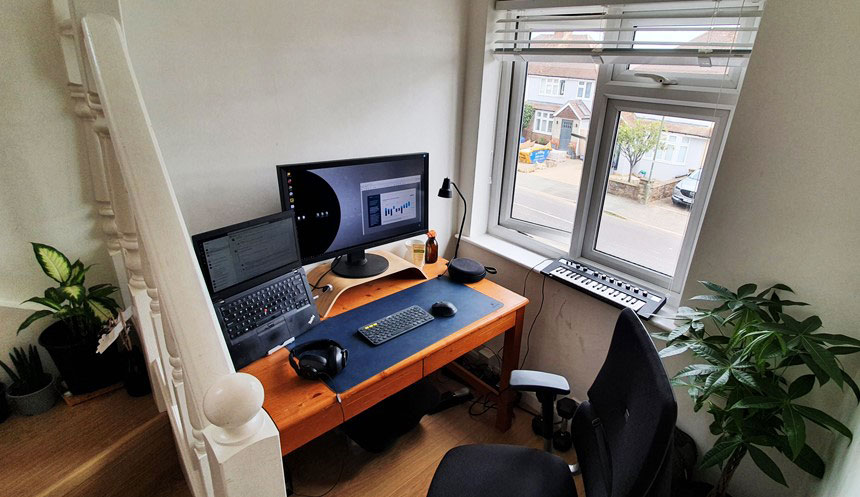 Sung's teleworking space at home located next to the stairway at home
Sung's teleworking space at home located next to the stairway at homeTell us about yourself. What do you do?
My name is Minje, and I am currently working on e-commerce and performance marketing at a company called Starcom within the global advertising agency Publicis Groupe. My office is located in downtown London, and I live in a town in Surrey called Addlestone, which is about an hour away from the downtown area. It is equivalent to the distance between Jongno-gu and Incheon in Korea.
How long have you been working from home due to COVID-19? How has it been?
It has already been four months since I started working from home in early March. In the UK, as mobility was restricted from early March, offices were closed, and most companies switched to teleworking. Government-supported paid leave was provided to essential workers unable to work from home. Luckily, my team members and I have already been working flexibly from home because of the nature of our digital marketing work, so it wasn’t too difficult for me to convert to 100 percent teleworking since COVID-19. However, because my kids have been spending all day at home since schools closed, I needed a separate workspace. Fortunately, the previous homeowner had remodeled our 1930s home, so we had extra space for a home office.
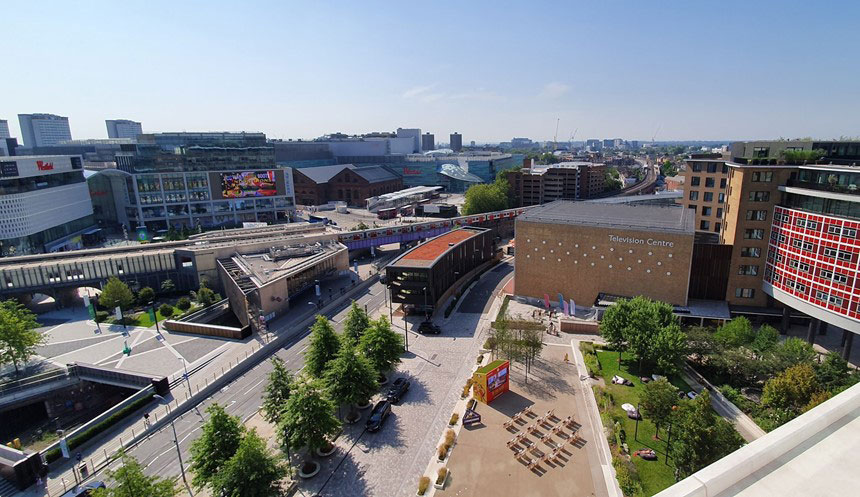 A view of London previously taken from the balcony of Sung's company office
A view of London previously taken from the balcony of Sung's company officeTell us about the changes in your life since COVID-19.
I had occasionally worked from home before the COVID-19 outbreak, but I’ve experienced several pros and cons after it changed to 100 percent teleworking. The whole family has been spending time together all day at home, space has become tight, and we’ve been busy preparing meals. My wife, our three oldest sons, and I take turns playing with our six-year-old second daughter, which has been more energy-consuming than expected, so we have been using streaming services such as Netflix and Disney Plus more regularly. Since I don’t necessarily need to work in the office due to the nature of the digital advertising industry where I’m employed, I think it will become more common to work remotely from home in the future. I am considering taking this opportunity to move our family to the countryside with beautiful natural surroundings.
What are the pros and cons of teleworking?
The advantages of working from home are that there is no stress from commuting, you can spend a lot of time with your family, and you can adjust your daily routine to suit your work style. My monthly salary indirectly increased slightly as transportation and food expenses decreased. After transitioning to 100 percent teleworking, however, the work-life balance sometimes collapses. I spend more time making brief video calls and writing e-mails during official work hours in the day and then work on more focused, time-consuming duties like writing proposals after my kids go to bed. As a result, there is a risk that overall work efficiency will gradually decrease as the days pass.
The biggest problem is that as you eat more snacks and exercise less often, your body can quickly become lethargic if you don’t take active care of your health. That is why I’m planning to buy a home training device like Peloton.
Lastly, please send a message to Yonseians in Korea and around the world.
I am actively involved in Yonsei University’s Alumni Association here in the UK. It is mainly a social gathering for golf, but I live in my part of the world with pride in my alma mater, for example, by attending the Yon-Ko Games every year. Since COVID-19, I believe there will be many changes in the lives of Yonseians around the globe. I wonder if the generalization of teleworking would be one of them. I hope that all Yonseians, including my seniors and juniors, will stay strong in such difficult times. AKARAKA~!!
---------------------------------------------------------------------------------------------------------------------
“In this unprecedented era of COVID-19, Yonsei University supports our alumni who are staying healthy and working faithfully from their homes in different parts of the world,” commented Professor Bong Gyou Lee (Graduate School of Information). “To adjust well to the new norm of teleworking in the non-face-to-face era, we must strive to maintain open communication with other members of our organization via various channels,” he added.
show mobile menu
mobile menu

